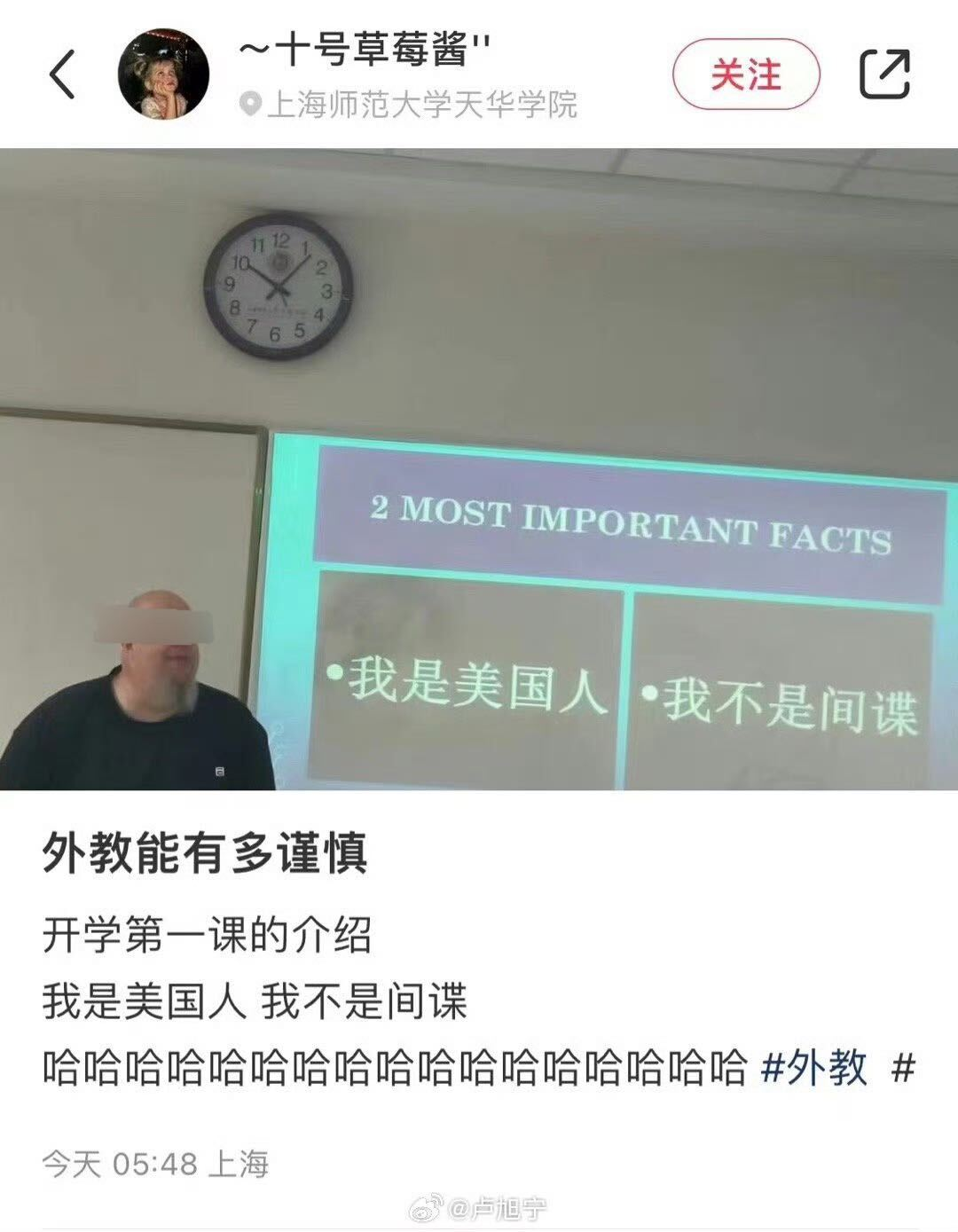A photo of an American teacher introducing himself to a Chinese university class with a slide presentation proclaiming, “I am not a spy” has gone viral, eliciting much mirth online. It also highlights an increasingly tense atmosphere in which suspicions of spying abound, teachers face being reported by their students for minor ideological infractions, and the Chinese government is attempting to mobilize the whole of society to fight espionage.
On September 15, Xiaohongshu user ~十号草莓酱” (~Shí hào cǎoméijiàng” or ~Strawberry Jam No. 10″) shared this photo of an American instructor at Shanghai Normal University’s Tianhua College:

CDT Chinese editors have compiled some comments from Weibo and other social media platforms in response to instructor’s precautionary presentation:
9米弧线:I propose that we expel all those westerners to keep this great nation of ours safe and secure forever.
过尽松陵路漫漫:He still doesn’t understand the profundity of Chinese culture, in which there’s always some little crime they can tag you with.
RAmen掷色子:Teach him the phrase, “There are no 300 taels of silver buried here.” [In other words, “A bald denial only exposes the bald truth.”]
寿司的骆驼比獁大:Excellent “public opinion guidance.”
自由飞翔2039:The world has changed. We’ll never go back to how things were 20 years ago.
风雨中的修行者:Spies are everywhere (haha)
沧海一宏ceo:[eating a melon] Only an American would be so paranoid! This just shows how brainwashed Americans are! [doge] [Chinese]
As Xiao Zibang, John Liu, and Philip Glamann reported for Bloomberg, teachers and students returning to Beijing university campuses this fall were met with training on an unexpected subject—how to combat foreign spying:
As students flooded back into Beijing’s top universities in early September, a propaganda blitz around campuses signaled an ominous addition to their syllabus: a crash course on how to catch spies.
At the government-run Tsinghua University videos were beamed onto faculty screens instructing teachers and students to become a “defense line” against foreign forces, while the Beijing University of Technology threw a national-security themed garden party, according to the nation’s spy agency.
Students at Beihang University, an aeronautics institute under US sanctions for its military links, were even asked to play an interactive training game, called Who’s The Spy? “In what special way will the college students around you reinvigorate national security?” the Ministry of State Security wrote on its new WeChat account. [Source]
Revisions this year to China’s Counter-espionage Law have raised concerns that businesspeople, academics, and others could easily be accused of spying simply for teaching, conducting academic and business research, or otherwise just doing their jobs. In August, the Chinese Ministry of State Security, tasked with domestic and international intelligence and counterintelligence operations, issued a call on its newly inaugurated WeChat account for “all members of society” to help it in that mission, offering rewards in exchange for information. The Chinese government and state media have nonetheless insisted that the revised law and the current anti-espionage push are “not a witch hunt.”
The current rhetoric around spying calls to mind past Chinese government campaigns against “hostile foreign forces” and “historical nihilism,” in which ordinary citizens, including students, were encouraged to call hotlines and report “suspicious” individuals—such as Chinese returning from abroad or expat boyfriends—and perhaps reap a sizeable reward. Teachers in China are already overburdened with extraneous tasks, pressed into service as grassroots policy enforcers, or asked to serve as crowd-filler (and sometimes crowd-control) during visits by high-ranking officials. Now it seems they will have to worry anew about being snitched on by students looking for a reward of up to 500,000 yuan (a “walking 500,000”).







